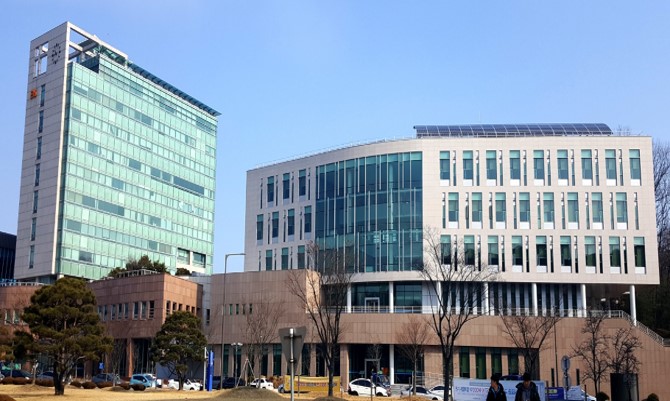fund

An endowment from the former Chairman of Mirae Industries, Moon Soul Chung, was used to establish the Yang Bun Soon Building in the Bio and Brain Engineering Department at KAIST. The opening ceremony for the building took place on February 8 and was attended by President Sung-Mo Kang, KAIST administrators, faculty, and students.
The Yang Bun Soon Building, named after the wife of Chairman Chung, is a new addition to the Bio and Brain Engineering Department complex. The five-story building was erected next to the 11-story Chung Moon Soul Building, which was completed in 2003 using a portion of his first endowment to KAIST. Chairman Chung donated approximately 30 billion KRW for funding a convergence research for IT and BT in 2001.
The new building was completed with financing from Chung’s second endowment of 21.5 billion KRW in support of the fields of brain and cognitive sciences in 2014. The building will accommodate both lab facilities and lecture halls.
At the ceremony, President Kang thanked the Chungs for their continuing generosity to KAIST. He commended Chung for showing how entrepreneurs can fulfill their social responsibility by supporting Korea’s future through donations and support.
(Photo caption: Chung Moon Soul Building (left) and Yang Bun Soon Building(right))
-
research A KAIST-SNUH Team Devises a Way to Make Mathematical Predictions to find Metabolites Related to Somatic Mutations in Cancers
Cancer is characterized by abnormal metabolic processes different from those of normal cells. Therefore, cancer metabolism has been extensively studied to develop effective diagnosis and treatment strategies. Notable achievements of cancer metabolism studies include the discovery of oncometabolites* and the approval of anticancer drugs by the U.S. Food and Drug Administration (FDA) that target enzymes associated with oncometabolites. Approved anticancer drugs such as ‘Tibsovo (active ingre
2024-03-18 -
research KAIST Develops Healthcare Device Tracking Chronic Diabetic Wounds
A KAIST research team has developed an effective wireless system that monitors the wound healing process by tracking the spatiotemporal temperature changes and heat transfer characteristics of damaged areas such as diabetic wounds. On the 5th of March, KAIST (represented by President Kwang Hyung Lee) announced that the research team led by Professor Kyeongha Kwon from KAIST’s School of Electrical Engineering, in association with Chung-Ang University professor Hanjun Ryu, developed digit
2024-03-11 -
research The World’s First Hacking-preventing Cryptographic Semiconductor Chip
With the dramatic increase in the amount of information exchanged between components or devices in the 5G/6G era, such as for the Internet of Things (IoT) and autonomous driving, hacking attacks are becoming more sophisticated. Consequently, enhancing security functions is essential for safely transmitting data between and among devices. On February 29th, a KAIST research team led by Professors Yang-gyu Choi and Seung-tak Ryu from the School of Electrical Engineering announced the successful
2024-03-07 -
event KAIST to begin Joint Research to Develop Next-Generation LiDAR System with Hyundai Motor Group
< (From left) Jong-Soo Lee, Executive Vice President at Hyundai Motor, Sang-Yup Lee, Senior Vice President for Research at KAIST > The ‘Hyundai Motor Group-KAIST On-Chip LiDAR Joint Research Lab’ was opened at KAIST’s main campus in Daejeon to develop LiDAR sensors for advanced autonomous vehicles. The joint research lab aims to develop high-performance and compact on-chip sensors and new signal detection technology, which are essential in the increasingly compe
2024-02-27 -
research A Korean research team develops a new clinical candidate for fatty liver disease
A team of Korean researchers have succeeded in developing a new drug candidate for the treatment of non-alcoholic fatty liver disease (NAFLD) acting on peripheral tissues. To date, there has not been an optimal treatment for non-alcoholic steatohepatitis (NASH), and this discovery is expected to set the grounds for the development of new drugs that can safely suppress both liver fat accumulation and liver fibrosis at the same time. A joint research team led by Professor Jin Hee Ahn from Gwang
2024-02-21